“Berlin sank down on me like a quilt covered with fiery flowers.” Irmgard Keun, The Artificial Silk Girl
After two years of delays due to COVID, we were finally able to launch UW’s Summer in Berlin program in 2022! Students spent five weeks taking language classes and exploring their new city; their language school campus, GLS, is right in the heart of Prenzlauer Berg, and they had easy access to transportation, quirky stores, vibrant restaurants and cafes, and a pulsing nightlife. Our group quickly discovered that Berlin truly is a city that never sleeps (move over New York!)
In addition to studying the German language, students also had access to courses in English that covered important cultural and historical periods related to the metropolis, ranging from the Weimar Republic to modern day Berlin. Students approached these topics from an interdisciplinary perspective, and one topic they examined was representations of women and sexuality. A highlight of this module was a visit to Weimar artist Jeanne Mammen’s atelier to learn more about her depictions of women against the backdrop of a rapidly changing society. We also picked up on issues of sexuality, gender and identity in our section on Magnus Hirschfeld and the LGBTQ rights movement in Berlin. Students read excerpts from Isherwood’s Christopher and His Kind and Darryl Pinckney’s Black Deutschland, and they listened to a podcast about Hirschfeld’s institution, the challenges it faced and the progress it made- progress that was eventually obliterated by the Nazis.
The timing of this session was fitting as it coincided with a momentous turn of events; on the very same day that Germany further loosened some lingering abortion restrictions, the United States Supreme Court overturned Roe v Wade. In the Making Gay History: Magnus Hirschfeld podcast, Eric Marcus discusses how passionately Hirschfeld advocated for LGBTQ rights, and how he also stood up for women’s rights, promoted the concept of consent, supported access to contraception, and sought to normalize pre-marital sex. He emphasizes how fragile these hard-won freedoms are, and how we must enact protest through social action and by supporting communities of color, trans, and non-binary people. This really resonated with students as they saw firsthand how the struggles of the past are carried on into the present. We visited the Memorial to the First Gay Emancipation Movement and asked students to produce a reflection on the memorial, the reading and the podcast. To conclude this module, we attended a performance of Cabaret, which is based on Isherwood’s writings and touches on themes of gender, sexuality and Weimar culture.
This call to protest became poignantly urgent through our module on Jewish Berlin and the Holocaust. Students attended a joyous production of Barrie Kosky’s All-Singing, All-Dancing Yiddish Revue at the Komische Oper. This show was one way for Kosky to return the Jewish culture that was destroyed by the Nazis back to its rightful place in Berlin. On opening night, Kosky stood before the audience and proclaimed: “Nazis, ihr habt nicht gewonnen. Diese Kultur lebt weiter.” During a visit to the Jewish Museum, students also saw a video in which Kosky, the first Jewish director in the Bayreuther Festspiele, talks about his reimagining of Die Meistersinger von Nürnberg, and how his work becomes a form of protest. He explains that the “best antidote” to Hitler and Wagner’s anti-Semitism is for Jewish musicians and artists to perform Wagner’s music and to have a Jewish director like himself staging and reconfiguring his operas. At this museum students were introduced to a broad spectrum of Jewish culture in Germany and we ended this session with a project exploring memorials to other victims of the Nazis. They also watched the film Conspiracy, visited the Haus der Wannsee Konferenz and took a walking tour focused on the challenges of memorializing the Holocaust.
Another stand-out module from the program was on Transcultural Berlin. We were so lucky to have best-selling author Miriam Yung Min Stein give a private lecture on the concept of being German and German identity and the way in which this concept is shifting with the emergence of new culture makers such as herself, providing a voice for underrepresented groups in German society. She brought each student a copy of her newest book, Die gereizte Frau, and many students commented that they were so happy to see their own identities reflected in Stein’s narrative about her struggle to claim her space in German culture. These themes were reinforced by a viewing of the film Audre Lorde: The Berlin Years at the Lichtblick Kino. To cap off this topic, students visited the new Humboldt Forum’s exhibition, Berlin Global, which reflects on Berlin’s past, present and future and the way it connects to the rest of the world. Students loved the thought-provoking and interactive nature of the exhibit and the way it touched on and summed up all of the topics we worked on in our classes.
There are too many experiences and events from the program to include in this short space, but we hope that we provided a snapshot of some of the compelling work that we did with our students. We had a fantastic group, and they engaged deeply with very complex and difficult questions surrounding Berlin’s turbulent and rich history.
-Andre Schuetze and Kye Terrasi
